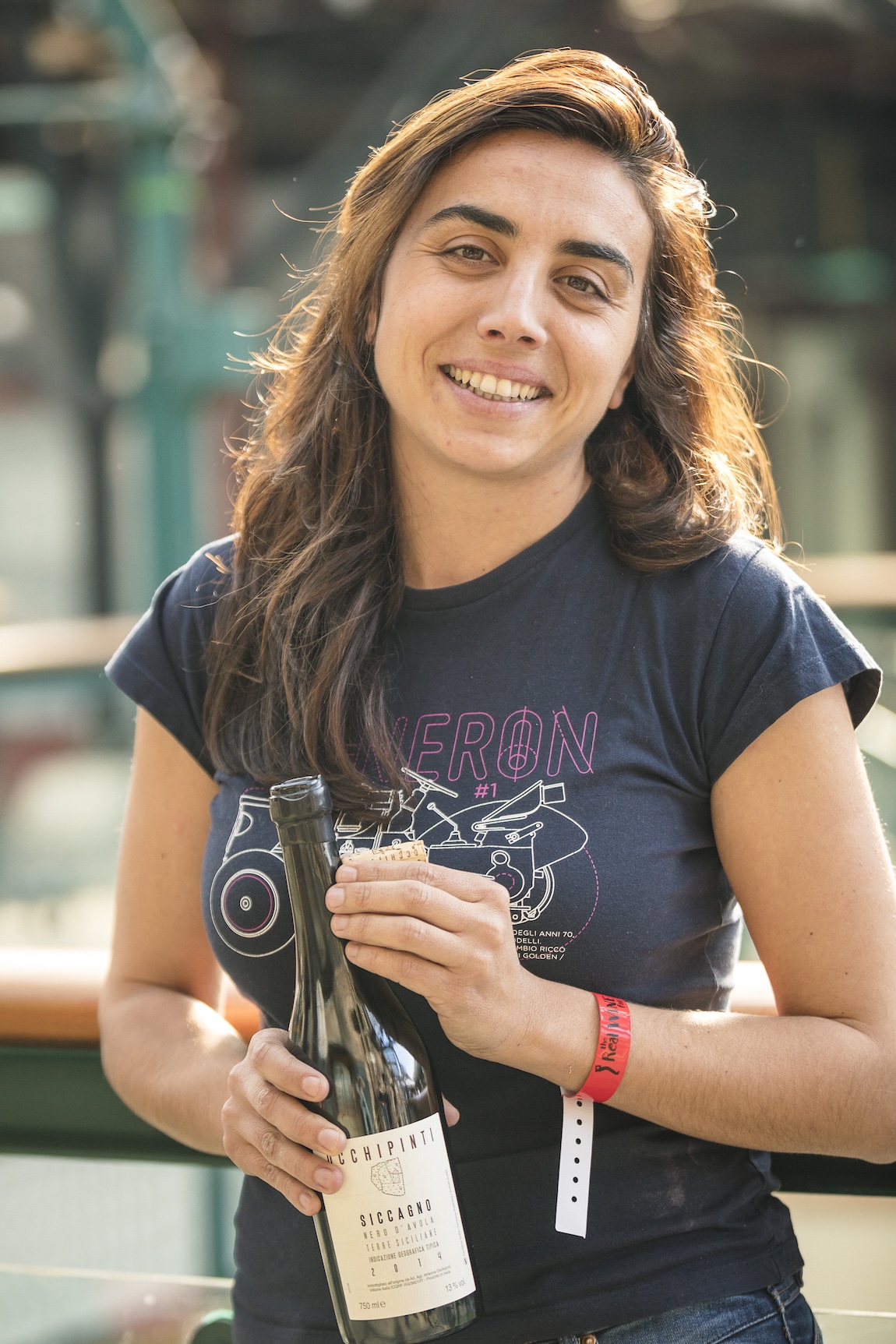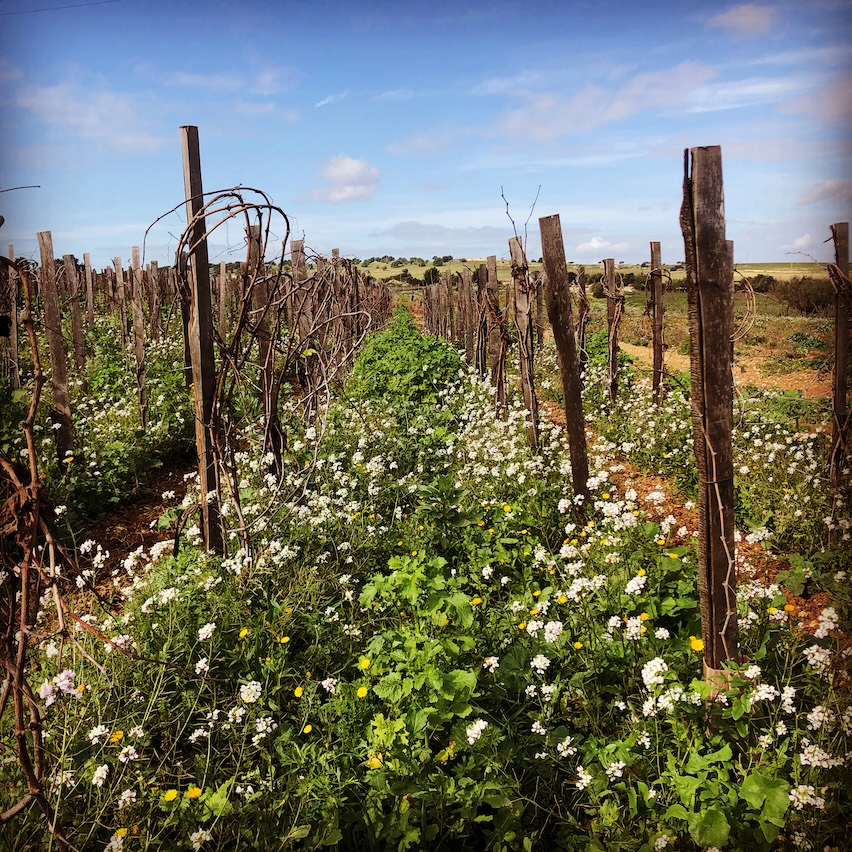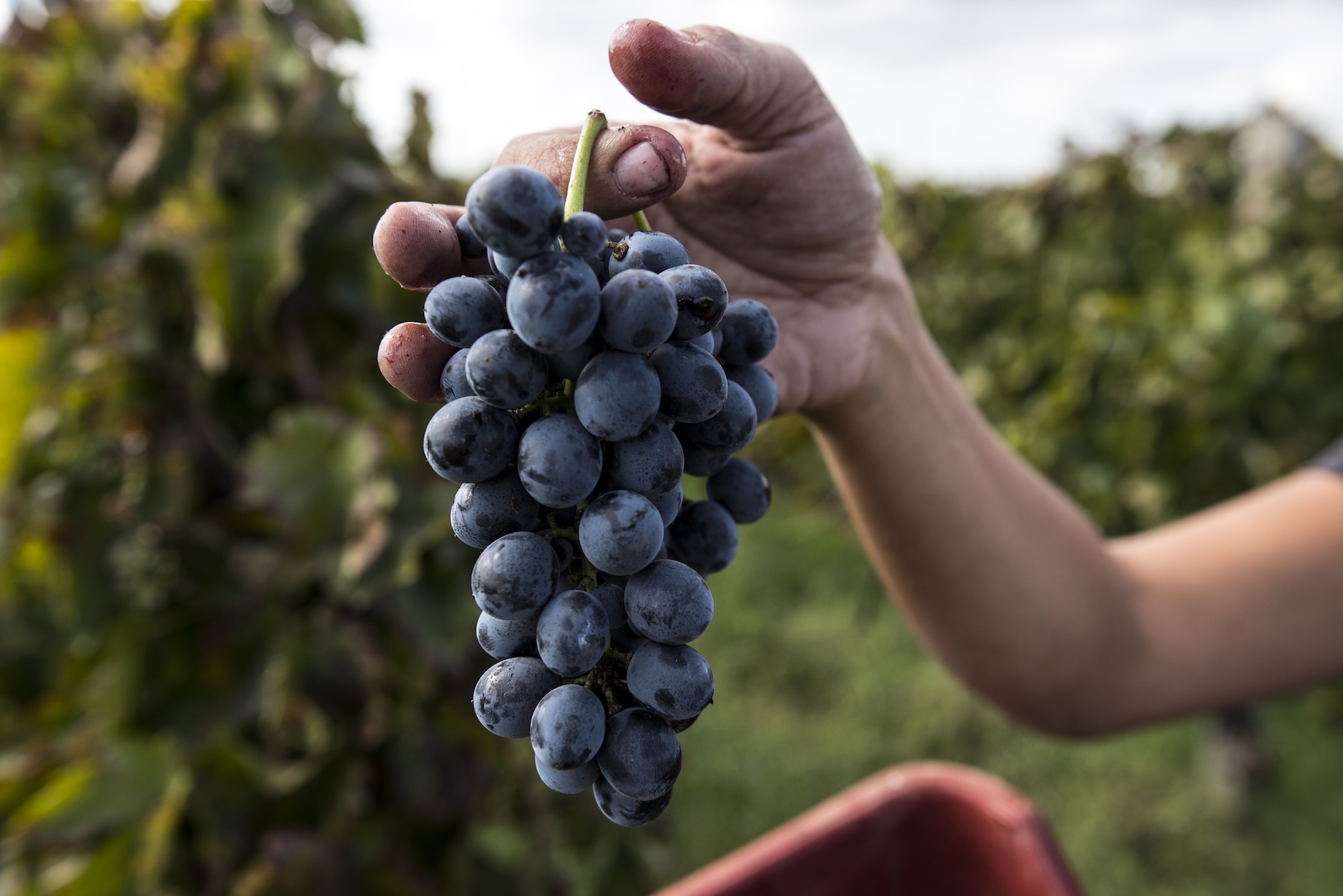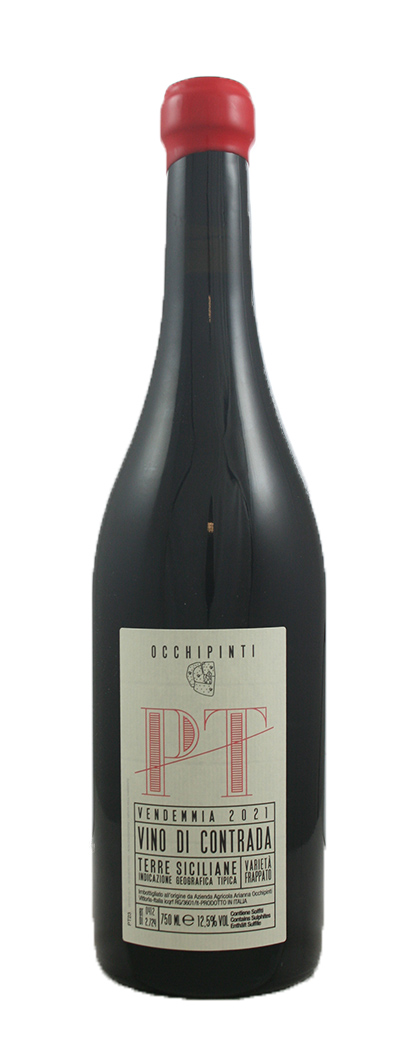Where Frappato (and now Grillo) sings
“From season to season the earth speaks to us, listens to us, responds to us. Ours is a silent and authentic dialogue. This is why there cannot be “a formula”, but convictions that arise from experience.”
Winemaking is so much more than what occurs in the winery. Above all else, Arianna Occhipinti is determined to develop a respectful relationship with the land: a direct and constant contact that transforms itself into profound knowledge. This entails looking for – and promoting – balance, respecting nature in every action: from planning the birth of a vineyard to its cultivation throughout the cycle, from the pruning which must be clean, precise and sympathetic, up to the processing and harvesting of the fruit.
This balance may be simply summarised: a good wine always comes from healthy grapes. They try to achieve this by encouraging biodiversity, the life in and around the vines. Arianna prefers to work the land by hand to be as close as possible to the vines themselves, and only use grapes from healthy soils, farmed without pesticides, fungicides, herbicides, chemical or synthetic fertilisers.
Her philosophy extends to consider the spontaneous materials that grow in the vineyards themselves and help oxygenate and nourish the soil, whilst augmenting these with mixtures of treatments other than green manure – such as leguminous plants, grasses and cruciferous plants which are sown in the spring, and that contribute to the development of vital organic matter and soil organisms. They further seek to preserve the surrounding natural flora and view it as a great resource. Hedges and bushes, the Mediterranean maquis, the wooded areas, and the olive trees of Tonda Iblae and Nocellara del Belice all flourish, to which they have added fruit trees, a vegetable garden and Tumminia wheat.
Above all else, Arianna Occhipinti is determined to develop a respectful relationship with the land: a direct and constant contact that transforms itself into profound knowledge.
They use and propagate old clones of the native grapes, making mass selection and grafting in the field. By doing this, the vineyard becomes more robust and carries within itself the texture of a past and the strength for its future. Harvesting is also done by hand. The grapes are meticulously selected first in the vineyard and then again in the cellar, only in this way do they believe they can work with the best, healthiest and most mature bunches. Healthy grapes tend to ensure healthy fermentations which take place spontaneously with their own indigenous yeasts. They accompany the wine in its evolution in by letting it breathe in non-intrusive containers that respect its vitality.
Arianna remarks: “”Our work in the vineyard is an inexhaustible source of observation.” She focuses on the classic varieties of Vittoria, namely Frappato and Nero d’Avola, and most recently on Grillo, on the subtle difference in the soils, of the potential of different areas and their influence on the wines. The vines work on an interplay of sand and limestone, which manifests in the wines as fruitiness and silkiness on the one hand, acidity and energy on the other (when the farming is right), and Arianna seeks to capture these qualities in a sympathetic vinification process. Her research led her to go further coming to the idea of “una vigna, un vigno” The Contrada wines project in Vittoria was born in 2016, followed by the desire to produce a wine in the Monti Iblei, and, in particular, in the area of Chiaramonte Gulfi, in the Contrada Santa Margherita.
The climate here is influenced by winds off the African continent (these often bring deposits of sand that covers the landscape). A dry cooling mistral-type wind swirls down from the north originally and then comes int from the south-western side of the island. This part of Sicily is experiencing drought with rainfall almost a third of normal, creating severe vine stress.
There are three main types of soil: limestone of a predominantly clay-sandy nature of Pliocene origin, rich in flints and shells on the first 25-30cm lying over deep sea carbonate sediments; silty sand, medium-textured and rich in iron and calcareous sediments, that allow the roots to deeply penetrate the soil, and tuphous sand, alternating calcareous stones and red sand, rich in iron, resting on carbonate sediments, porous, rich in fossils and marine debris.
The estate comprises eight vineyard zones of varying sizes, four of which provide the selection of grapes for each of the Contrada wines. Bombolieri, planted in 1999 at 212 m above sea level, is the most southerly of these nestled against the SP68 road adjacent to the winery, and Frappato di Vittoria, Nero d’Avola, Zibibbo and Albanello grow here on 25 cm surface layer of white sand interspersed with compact limestone rock. The 100% Contrada Frappato wine called BB comes from here. One is not allowed to refer to the Contrada name on the label, which therefore has the initials BB – crossed out!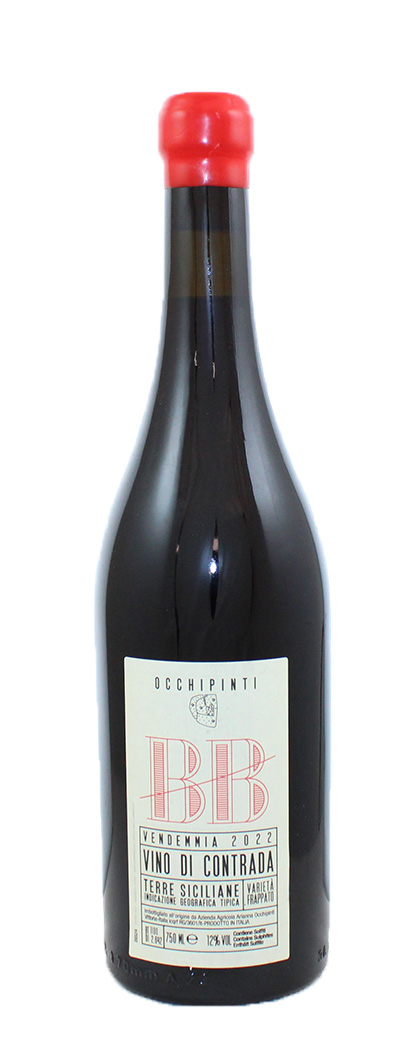
Fossa di Lupo, at 214 metres above sea level, is located just north-east of this vineyard on the same winding road. This plot (guyot and bush vine trained) is planted to Frappato and Nero d’Avola only. Here we find 40cm of brown sand over a bedrock of compact limestone.
Pettineo (217 m above sea level and north/south exposition) is the oldest vineyard (68-years-old bush vines and espalier trained), planted solely to Frappato. It lies on 60 cm of red sand with a layer of “tuff” (porous rock) in the subsoil. This vineyard gives its names to the PT cuvee.
Grapes for all the reds are harvested towards the end of September normally, are 80% destemmed with the berries kept whole, and then fed into large concrete fermenters. All the wines macerate gently on their skins for 20-days before maturation for a further 20-22 months in cement ovals and a short period in bottle. A small amount of sulphites may be added during vinification, but never at bottling.
Frappato di Vittoria is often viewed as a lighter red grape variety used to ameliorate the darker, heavier Nero d’Avola in the Cerasuolo di Vittoria DOCG wines. In fact, Frappato is more tannic than Nero d’Avola and, farmed sympathetically on the best limestone soils in the region, presents fresh, perfumed wines with red fruit flavours, a line of acidity running through them and fine crunchy tannins. The grape variety is a beautiful vehicle for terroir expression, which is why Arianna has chosen it specially for her Contrada range of reds.
BB, from light-coloured, almost white chalky-sand shallow soils, is the most upfront and floral of the three Frappatos. It is fresh and energetic with beguiling aromas of cherries, wild strawberries, and blood orange and the classic Frappato perfume of incense. The acidity is most pronounced in this wine, and the purity of the limestone comes through clearly. FL is almost Nebbiolo-like, quite austere with notes of dried fruit, rose, cedar and wild herbs with a nice punch of acidity on the finish. An earthy wine with a touch of salinity. Finally, PT, from the oldest vines on the estate, has rich fruitiness and gorgeous smooth tannins.
Finally, the most recent addition to the Contrada family comes from Santa Margherita on the foot slopes of the Iblean Mountains. Here Arianna planted Grillo (from cuttings taken from a grower in the Marsala region of the island) in 2016. The vineyard is trained in bush vines and Guyot, is at 490 m above sea level, and orientated northeast/southwest; northwest/southeast; and east/west.
Grapes are harvested in the first week and a half of September, and, after a 48-hour maceration, are fermented with native yeasts in concrete tanks and 25-hl Stockinger oval foudres, before ageing for a further 10 months in the same vessels and four months in bottle. The wine style has changed over the years from amber and exotic to more elegant and restrained with citrus tones and precise minerality.
Part of Arianna’s journey is the realisation that one needs to work with nature to preserve the balance in the wines. Vine growing and winemaking is about listening to the vintage and respecting the territory and therefore must always be responsive. Even though the wines are different for the reasons mentioned, there is a common thread running through them and they possess the qualities of freshness, minerality and strength. In a vintage such as 21 we taste the warmth of the rocks and maquis in the wines, those signifiers of Mediterranean island terroir, whereas in the challenging 2022 , the wines are charming, lighter and more floral.
Frappato, the historical variety of Vittoria, which Arianna is devoted to, may present itself variously as delicate, austere, and bloody. Here, in the Contrada wines, Frappato is an instrument to transmit the terroir, reading the earth, the smells, the daily perceptions, and converting them into wine.
2023 Contrada SM
2022 Contrada BB
2022 Contrada PT
2022 Contrada FL
*
Interested in finding out more about Arianna Occhipinti’s Contrada wines? Contact us directly:
shop@lescaves.co.uk | sales@lescaves.co.uk | 01483 538820


